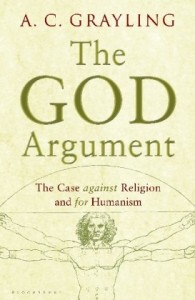 The God Argument (The Case Against Religion and for Humanism) by A. C. Grayling was a bit of a slow read for me, compared to a few other books I’ve read on this topic. This was, I believe, my first brush with secular humanism and it’s nice to have a basic definition of the concepts.
The God Argument (The Case Against Religion and for Humanism) by A. C. Grayling was a bit of a slow read for me, compared to a few other books I’ve read on this topic. This was, I believe, my first brush with secular humanism and it’s nice to have a basic definition of the concepts.
“Secularism is the principle of maintaining a separation between religious interests and bodies, on the one hand, and the state, on the other hand, on the premise that religion has no greater claim than any other self-interest outlook in debates about matters of government and public policy.”
“The basis of humanism is that we are to answer the most fundamental of all questions, the question of how to live, by reflection on the facts of human experience in the real world, and not on the basis of religion. […] As a broad ethical outlook, humanism involves no sectarian divisions or strife, no supernaturalism, no taboos, no food and dress codes, no restrictive sexual morality other than what is implicit in the demand to treat others with respect, consideration and kindness.”
Humanism’s two fundamental premises: 1) “there are no supernatural agencies in the universe,” 2) “our ethics must be drawn from, and responsive to, the nature and circumstances of human experience.”
“A key requirement (of humanism) is that individuals should think for themselves about what they are and how they should live. […] It imposes no obligations on people other than to think for themselves.”
Same for stoicism which, at first glances, seems to share some ideas with Buddhism.
“Stoicism’s main doctrine was that one should cultivate two capacities: ‘indifference’, and self-control. They used the term ‘indifference’ in the strict sense of this term to men neutrality, detachment, as in not taking sides on a question, or being disengaged from a quarrel.”
A few more ideas that got some highlighter »
“A critical examination of religion’s claims places it in the same class as astrology and magic.”
“Everywhere that science and education have advanced, so religion has dwindled in influence.”
“The major reason for the continuance of religious belief in a world which might otherwise have long moved beyond it, is indoctrination of children before they reach the age of reason. […] If religious doctrines and systems were not taught to people until they had attained maturity, how many would subscribe to a religion?”
“All religious people are superstitious, but not all superstitious people are religious.”
“The positive characteristics attributed to deity are the ones we humans most approve of and wish we had.”
“It is wrong always, everywhere, and for everyone, to believe anything upon insufficient evidence.” — W. K. Clifford
“A religious explanation of how the world began, why it exists, and where we are all going to end, can be given in twenty minutes or less. It takes years to master the rudiments of physics.”
“Darwinism is not compatible with religion; the evidences of biological science are evidences against the presence of supernatural agency in the universe.”
“Atheism is to theism as not collecting stamps is to stamp-collecting. Not collecting stamps is not a hobby.”
“From the athiest’s point of view, talk of goblins has an exact parity with talks of gods and goddesses.”
“Is something good because the gods say it is, or do the gods say it is good because it is independently of them?”
“Being dead is no part of our personal experience. Death is what happens to other people. We experience dying for ourselves; but we experience death only in losing others, and the experience is one of grief and loss. Accordingly, our own deaths are no part of our personal experience: each of us experiences only life, of which dying is part. In this sense, from the subjective perspective we are immortal.”
“Between 800 and 3,000 new religious sects, or even new religions as such, have sprung up since the Second World War, most of them in the United States and Africa.”
“Religious ethics is based on the putative wishes — more accurately: commands — of a supernatural being. For the humanist, the source of moral imperatives lies in human sympathy.”
“The question of how one should live and what sort of person one should be is an ethical question, not a moral one.”
